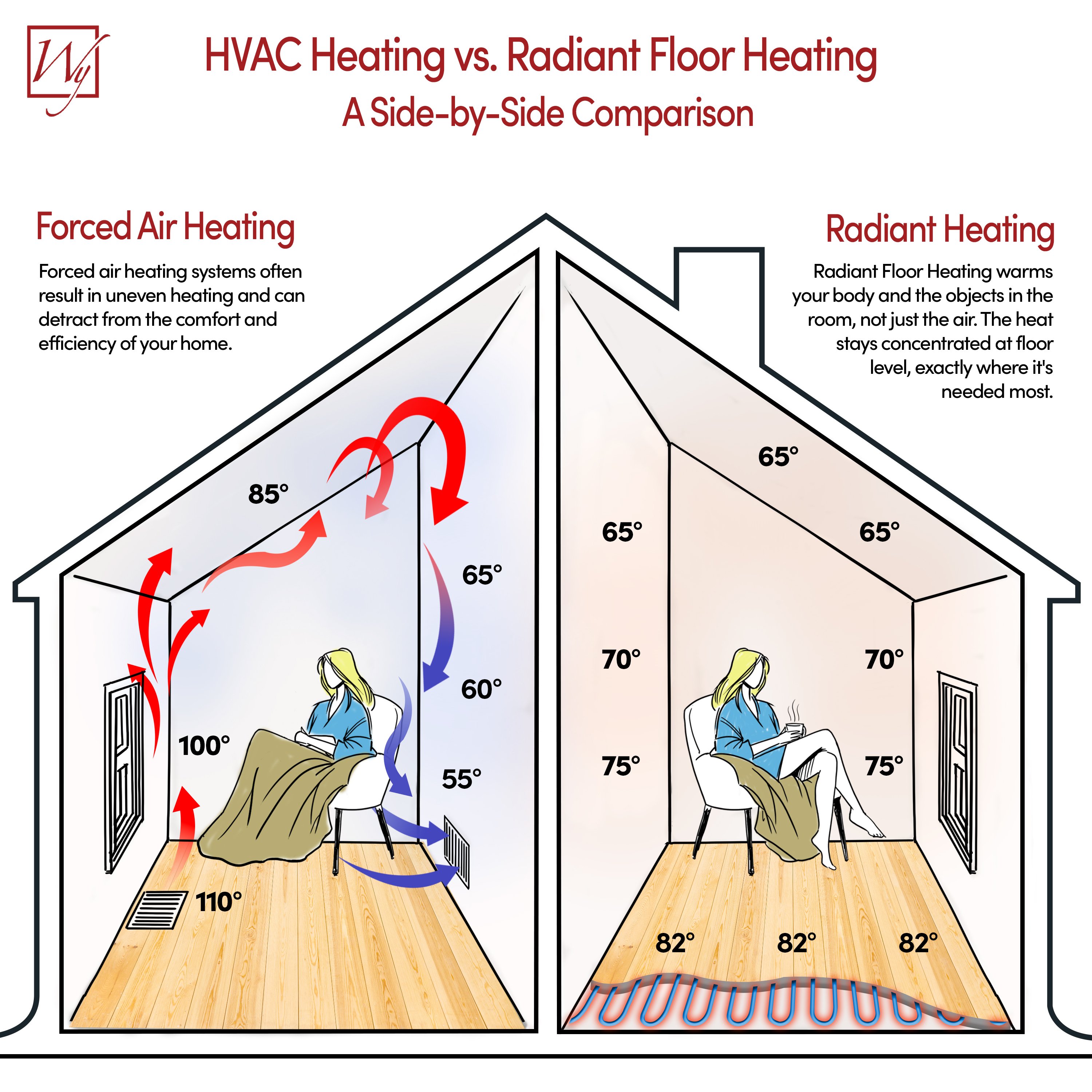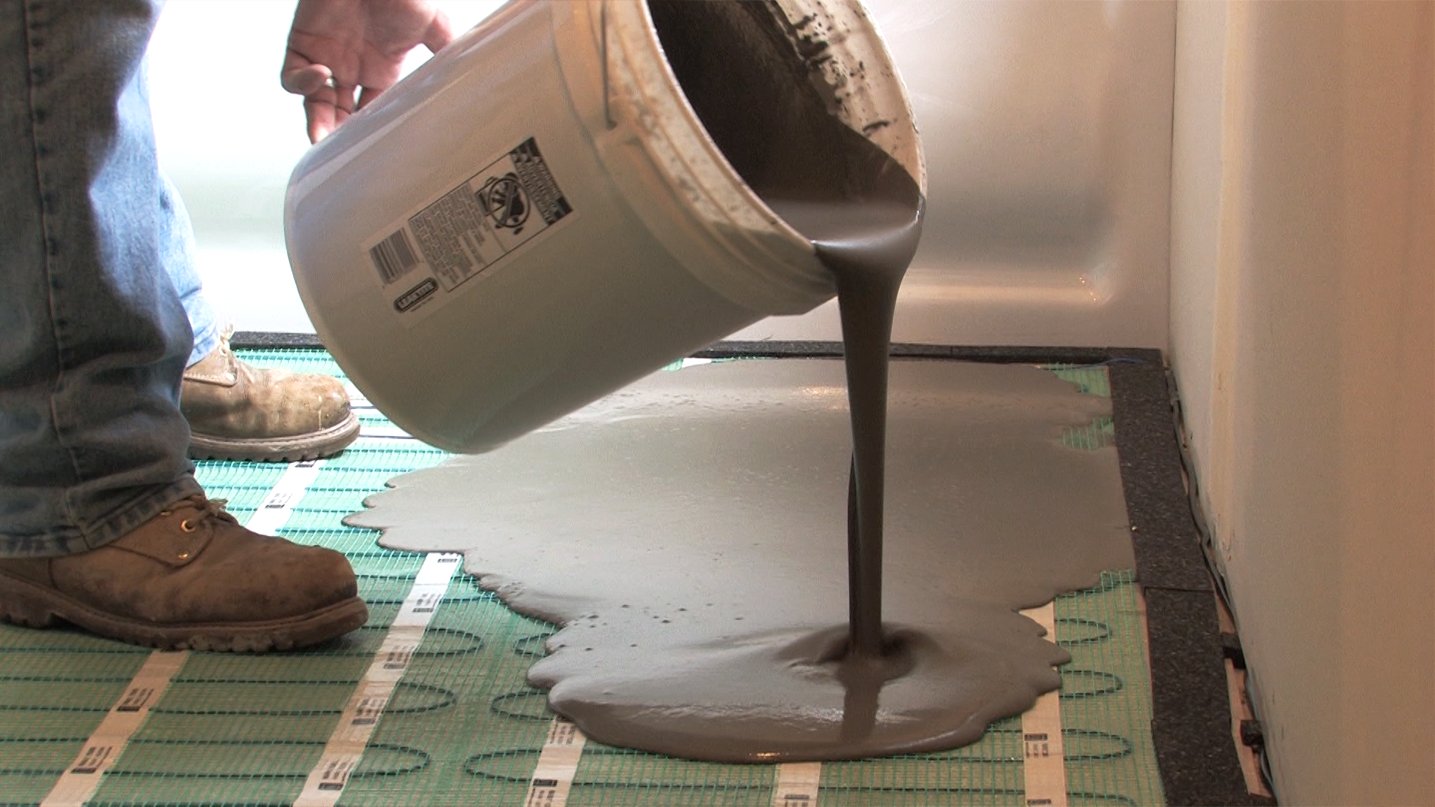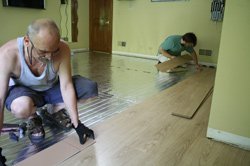Electric floor heating is a popular solution for homeowners seeking comfort, efficiency, and luxury in their living spaces. Whether you’re considering radiant heating for a bathroom, kitchen, or entire home, you likely have questions about how it works, installation, costs, and more. Below, we address the most common questions to help you make an informed decision.
How Does Underfloor Heating Work?
Underfloor heating, also known as radiant floor heating, is a cutting-edge solution for achieving consistent warmth and energy efficiency in modern homes. Mimicking the way the sun heats the Earth, this system delivers heat directly to the floor, which then radiates upward to warm objects and people in the room. Unlike traditional heating methods that rely on warming the air, radiant heating focuses on infrared heat transfer—providing a cozy, even warmth without cold spots or drafts.
What Is the Science Behind Radiant Heat?
Radiant heat works by transferring thermal energy from a warmer surface (like heated cables or water pipes) to cooler objects. This process is incredibly efficient because it bypasses air as a medium, ensuring that heat reaches you directly. For example, walking into a room with radiant floor heating feels similar to basking in sunlight—your body absorbs the warmth naturally. This mechanism explains why underfloor heating systems are more effective and energy-efficient than forced-air systems.
In general, radiant floor heating systems heat up a room just like the sun heats the earth. Instead of heating the air, the sun’s rays directly warm the people and objects they come into contact with. Think about it — when you’re standing in the shade, it feels noticeably colder than when you’re standing in direct sunlight. That’s because the infrared heat from the sun is in action. Similarly, radiant floor heating systems heat the flooring in a room, which then transfers to the items in the room — including your feet. This heating method takes the chill off even the coldest flooring materials and leaves any room feeling comfortably warm — even when the ambient temperature is cooler. Typically, this type of heating can be delivered two ways: via hot water (hydronic) or electricity.
What’s the Difference between Hot Water and Electric Floor Heating Systems?
Hydronic Systems: Utilize hot water pumped through plastic tubing beneath the floor. They’re ideal for new constructions and whole-house heating. However, they require boilers, heat pumps, and gas lines, making them more complex and costly to install. Repairs can be challenging due to the difficulty in locating leaks, and they take longer to heat up.
Electric Systems: Use electric cables to warm the floor. They’re perfect for remodeling projects and partial home heating, like bathrooms. Installation is straightforward, often integrating seamlessly with existing circuits. They’re quick to heat (usually within 30-60 minutes) and easier to repair, as issues can be pinpointed with thermographic cameras. However, for larger areas, additional amperage may be needed, potentially requiring a circuit panel upgrade.
Hydronic Floor Heating: Pros and Cons
Hydronic floor heating systems are generally best-suited for new-construction projects and whole-house heating. They require a boiler, heat pumps, and gas lines, which should ideally be in place before considering installation of a hydronic floor heating system. When these items are already in place, the cost of operation for a whole-house system should be lower than electric floor heating because the cost per square foot drops as the square footage increases. However, if the home is not already equipped with a boiler, the overall cost may be higher because the boiler alone can cost a few thousand dollars. Additionally, hydronic systems are difficult to repair because it’s impossible to identify the exact location if a leak occurs. Plus, they take much longer to heat up than electric systems do.
Electric Floor Heating: Pros and Cons
Electric floor heating, on the other hand, is ideal for a remodeling project and better suited for partial home heating, such as in the bathrooms. Electric floor heating systems are relatively easy to install and can usually be wired seamlessly to an existing circuit. That makes including them in renovation projects especially easy. However, they may require extra amperage if they’re being installed in large rooms or throughout an entire house. This could mean you’d need to upgrade your circuit panel, which doesn’t come cheap.
On the plus side, they’re ultra-thin, which means the height of the floor would only rise minimally, and they’re inexpensive to install. At WarmlyYours, an electric floor heating system costs between $10 and $20 per square foot. Additionally, they’re easy to repair because any shorts in the system can be located with a thermographic camera. This means you won’t have to remove the entire floor to locate and repair the issue.
Finally, electric floor heating systems heat up quickly (usually within 30-60 minutes), making them more energy efficient. However, a possible downside is that the cost of operation may be high depending on the cost of electricity where you live. To find out how much it would cost to operate a system in your home, check out the WarmlyYours’ Operating Cost Calculator.
How Does In-Floor Heating Compare to Central Air Heating?
When evaluating home heating options, radiant floor heating and forced-air (central heating) systems represent fundamentally different approaches—each with distinct advantages and drawbacks. Here’s a detailed comparison:
Forced-Air Heating: Convenience with Compromises
Forced-air systems, common in North American homes, use a furnace to heat air that’s distributed through ductwork. While cost-effective to install initially, they suffer from energy inefficiency (up to 30% heat loss through leaky ducts, especially in unconditioned spaces like attics). The design also creates uneven heating, as vents concentrate warmth in specific areas, leaving cold spots. Additionally, blowing air circulates dust, mold spores, and allergens, aggravating respiratory issues. Maintenance demands—like duct cleaning and filter changes—add long-term costs.
Radiant Floor Heating: Efficiency and Comfort
In contrast, radiant floor heating (electric or hydronic) delivers heat directly through floors via cables or water-filled tubing. This method is 25–40% more energy-efficient than forced-air systems because:
- Heat rises evenly, eliminating cold zones.
- No ductwork means zero energy loss from leaks or heat dissipation.
- Operates at lower temperatures (typically 85–104°F vs. forced-air’s 120–140°F) while maintaining comfort.
Radiant systems also improve indoor air quality (no airborne allergens) and work silently—unlike noisy forced-air blowers. While installation costs are higher (especially for hydronic systems), lower operating expenses and 30+ year lifespans often justify the investment.

In-Floor Heating vs. Central Air: Key Differences
Feature | In-Floor Heating | Central Air Heating |
|---|---|---|
Energy Efficiency | 100% efficient — all electricity is converted directly into floor heat. | Lower efficiency (duct leaks, heat loss) |
Heat Distribution | Even, radiant warmth from floor | Uneven, blown air creates drafts |
Air Quality | No allergen circulation | Distributes dust/allergens |
Maintenance | No Maintenance | Regular filter changes & duct cleaning |
Best For | Comfort, allergies, energy savings | Quick install, whole-home HVAC |
Pro Tip: Pair in-floor heating with a mini-split AC system for year-round climate control without ductwork.
Do I have to Replace my Floor to Install Radiant Floor Heating?
Yes—radiant floor heating systems are installed beneath the finished floor surface, so your existing flooring will need to be removed. That might sound like a big step, but it’s actually the perfect opportunity to enhance your space.
Think of it as adding a hidden luxury layer beneath your feet. The heating elements (whether electric mats or hydronic tubing) sit between the subfloor and your new flooring material, making installation ideal during:
- Remodeling projects (bathroom makeovers, kitchen expansions)
- Flooring upgrades (replacing old tile, installing hardwood or luxury vinyl)
- New construction (the easiest time to integrate radiant heat - especially hydronic)
Pro Tip: Pair radiant floors with natural stone or tile for maximum efficiency—these materials retain heat beautifully, turning your bathroom into a spa-like retreat. Even better? You’ll save 10–20% on heating bills compared to forced-air systems, making it a smart long-term investment.
Does Floor Heating Work with Every Floor Type?
Yes—but with a few smart considerations. Radiant heating systems are remarkably versatile, designed to work under nearly any flooring replacement in the U.S., including:
- Tile & stone (best for heat retention and efficiency)
- Engineered wood (ideal for stability)
- Vinyl, laminate, and luxury vinyl plank (LVP) (check manufacturer specs)
- Wall-to-Wall Carpet (approved in the U.S. - check local code in Canada)
- Concrete (embedded systems provide long-lasting warmth)
Key Insight: Not all materials conduct heat equally. For optimal performance:
- Tile and stone are top-tier choices, heating quickly and retaining warmth like a thermal battery.
- Engineered wood outperforms solid hardwood, which is more prone to warping from temperature swings—especially when using a hydronic system.
- Avoid cork—it’s a natural insulator and may diminish maxiumum heat transfer.

Pro Tip: Pair radiant heat with thin, dense flooring (e.g., porcelain tile or 3/8" engineered wood) to maximize efficiency. The thinner the material, the faster warmth reaches your feet.
Important Note: Systems vary by floor type. Electric mats suit tile/stone, while low-profile foil systems are better for floating floors. Always confirm compatibility with your flooring manufacturer before installation.
Fun Fact: Radiant-heated tile bathrooms can feel 15°F warmer than rooms with forced-air systems—even at the same thermostat setting.
For more information about the specific brands available for each flooring choice, click here.
What's the Difference Between Embedded and Adhesive-Free Floor Heating Systems?
The key difference lies in installation method and flooring compatibility:
WarmlyYours provides floor heating solutions for both installation types to suit a wide range of flooring and project needs.
- TempZone™ & Slab Heating: Embedded in thinset or concrete for tile, stone, or nailed hardwood.
- Environ™: Adhesive-free for floating floors like laminate, carpet, or engineered wood.
Where are embedded systems best used?
- TempZone™: Ideal under tile/stone (embedded in thinset or self-leveling cement).
-
Slab Heating: Designed for fresh concrete pours (basements, garages).

Pro Tip: Embedded systems boost heat transfer by 30% compared to floating-floor options.
Why choose adhesive-free systems?
Environ™ requires no mortar or glue—just roll it over the subfloor before laying floating floors. Benefits:
- Faster installation (no curing time for thinset).
- No floor height buildup (critical for transitions between rooms).
- Gentler heat (prevents warping in engineered wood).
- DIY-friendly installation (no specialized tools or materials required)

Can I Cut My Floor Heating Element to Make it Fit (Spoiler: Please Don't!)
Short answer: Nope. Nada. Never.
Why? Because Ohm’s Law says no—and physics isn’t negotiable. Here’s the breakdown:
- Cutting the heating element lowers its resistance, making it overheat like a caffeine-fueled squirrel.
- This can fry the system, void warranties, and possibly turn your cozy floor into a toaster (not the fun kind).
But Here’s What You Can Adjust:
The cold lead (a.k.a. return power lead)—that 15-foot non-heating cable that runs from the floor up the wall to your thermostat—can be shortened if needed.
Why? Because it’s just a wire, not the actual heating element. So in smaller rooms where you don’t need all 15 feet, you’ve got two safe options:
- Coil the excess neatly inside the wall (keeps things tidy).
- Cut it to length (yes, you officially have our permission—just leave enough slack to connect to the thermostat comfortably).
Always check your manual before snipping—some systems prefer looping over trimming
Pro Tip: If your heating mat is too big:
- Adjust wire spacing (but never closer than 2 inches).
- Return it for the right size—because DIY electrical edits belong in action movies, not your home.
Is Electric In-Floor Heating Safe?
Yes, WarmlyYours electric floor heating systems are designed with multiple layers of safety. All products are UL Listed and cUL Certified, having undergone rigorous testing by Underwriters Laboratories (UL)—the leading global safety certification body.
Key Safety Features
- Double-insulated heating cables with protective sheathing that helps virtually eliminate EMF and adds durability.
- Overheat prevention: An installed floor sensor ensures the surface never exceeds safe temperatures (e.g., 104°F / 40°C for tile).
Certifications & Compliance
- UL/CUL/US Listed: Validated for electrical and fire safety in North America.
- RoHS Compliant: Free of hazardous materials like lead or mercury.
Built-In GFCI Protection
Every WarmlyYours thermostat features integrated Class A GFCI (Ground Fault Circuit Interrupter) protection, which:
- Detects faults instantly, shutting off power if current leakage exceeds 5 mA (milliamps)—far below dangerous levels.
- Eliminates the need for additional GFCI breakers, as dual protection can cause system conflicts.
- Meets NEC 424.44 (G) electrical code requirements for personnel protection.
Can Electric Floor Heating be a Primary Heat Source?
Yes, in most cases—but success depends on your room's insulation and heat loss factors. Radiant floor heating can effectively serve as a primary heat source, especially in well-insulated spaces with modern windows and minimal drafts. However, rooms with significant heat loss (e.g., drafty fireplaces, single-pane windows, or uninsulated exterior walls) may require supplemental heating.
Key Considerations for Primary Heating
- Insulation Matters: A room with R-19 wall insulation and energy-efficient windows retains heat better than poorly insulated spaces.
- Flooring Type: Tile and stone floors maximize heat retention, while carpet or laminate may require higher wattage systems.
- Climate: In extreme cold (below freezing), radiant heat may need backup support to maintain consistent warmth.
How to Check Your Home or Room’s Suitability
Use WarmlyYours’ Heat Loss Calculator to analyze:
- Insulation quality
- Window/door efficiency
- Flooring type
- Local climate conditions
The tool provides a customized report, including estimated operating costs during peak winter months.
What Does It Cost to Run Electric Floor Heating?
The cost to operate electric floor heating depends largely on your local electricity rates and how often you use the system. As of April 2025, the national average electricity rate in the U.S. is approximately 16.26 cents per kilowatt-hour (kWh). This rate varies by state and utility provider, so your actual cost may be higher or lower depending on where you live.
Factors Affecting Operating Costs
- Electricity Rate: The price you pay per kWh directly impacts your monthly bill.
- Usage Time: How many hours per day you run the system influences total consumption.
- Room Size and Insulation: Larger or poorly insulated rooms require more energy to maintain warmth.
WarmlyYours Operating Cost Calculator
To help homeowners estimate their specific costs, WarmlyYours offers an easy-to-use Operating Cost Calculator. By entering your:
- Heating system type
- Room size
- Zip code (to factor in local electricity rates)
- Daily usage hours
How Much Does a Floor Heating System Cost?
Cost Range Overview
WarmlyYours radiant floor heating systems typically cost $8–$20 per square foot, with pricing influenced by:
-
System Type:
- TempZone Cable: Loose cable systems ($6–$12/sq ft): Lower material cost but require more labor.
- TempZone Rolls: Pre-spaced mats/membranes ($10–$20/sq ft): Higher material cost for easier, faster installation.
- Project Size: Larger areas (100+ sq ft) reduce per-square-foot costs due to bulk pricing.
- Flooring Compatibility: Tile/stone systems are often cheaper than solutions for floating floors.
Pro Tip: For DIYers, TempZone Flex Rolls (pre-spaced cables) balance cost ($10–$15/sq ft) and install simplicity, saving up to 40% in labor.
Get a Custom Quote
Use WarmlyYours’ Instant Quote Tool to:
Enter the room type, subfloor, flooring material, and the area you want to heat.
Compare real-time pricing for all compatible systems.
- Receive a free SmartPlan with installation diagrams and power requirements.
Still Have Questions? We’re Here for You.
We hope this blog helped answer some of the most common questions about electric floor heating—but if you’re still curious or unsure about anything, we’re just a call or click away.
At WarmlyYours, we believe warmth goes beyond the floor—it’s about how we treat our customers. As the owner, I take that personally. We’d be honored to help you bring more comfort into your home.
Contact us today or explore our Instant Quote Tool to take the next step.





If I have hot water in floor heating and a wool rug with rubber underlay..would that cause any problems
That could cause a problem with "trapped heat" due to the insulative properties of both wool and rubber. It will depend on a number of factors (size and thickness of the rug, the r-level of the rug, the size of your heating system) but there is a good chance that this could negatively impact the performance of your heating system, unfortunately.
What is the optimal balance thermostat setting between comfort and energy efficiency?
Thanks for taking the time to read and submit a question. The answer is that there isn't a perfect number because there will always be a number of variables (like the insulation level in your home, the weather and ambient temperature in your home, and the heating system you've selected) that will greatly impact this number. However, do generally recommend people start with the floor temperature (not the temperature in the room) to 82 degrees Fahrenheit. This should be a good starting point for comfort. You can get an idea of how much it will cost to run the system using our Operating Cost Calculator here: https://www.warmlyyours.com/floor-heating/cost-calculator Hope that helps!